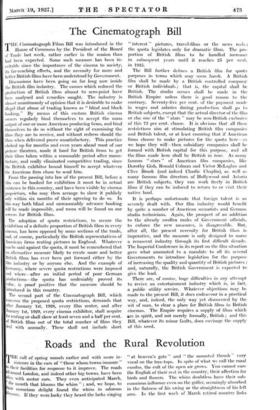The Cinematograph Bill T HE Cinematograph Films Bill was introduced in
the House of Commons by the President of the Board of Trade last week, rather earlier in the session than had been expected. Some such measure has been in- evitable since the importance of the cinema to society, its far-reaching effects, and the necessity for more and better British films have been understood by Government.
Discussions have been going on for long now inside the British film industry. The causes which reduced the production of British films almost to zero-point have been analysed and remedies sought. The industry is almost unanimously of opinion that it is desirable to make illegal that abuse of trading known as " blind and block booking." By means of this custom British cinema owners regularly bind themselves to accept the mass output of one or more American producing firms, and bind themselves to do so without the right of examining the films they are to receive, and without redress should the films when delivered prove unsatisfactory. This practice choked up for months and even years ahead most of our picture theatres, made it hard for British firms to get their films taken within a reasonable period after manu- facture, and really eliminated competitive trading, since the British exhibitor bound himself to accept whatever the American firm chose to send him.
From the passing into law of the present Bill, before a film can be booked for exhibition it must be in actual existence in this country, and have been visible by cinema proprietors, Who may then arrange to show it publicly only within six months of their agreeing to do so. In this way both blind and unreasonably advance booking will he made impossible, and room will be found on our screens for British fihns.
The adoption of quota restrictions, to secure the exhibition of a definite proportion of British films in every cinema, has been opposed by some sections of the trade, and, of course, particularly the British representatives of American firms renting pictures in England. Whatever can be said against the quota, it must be remembered that no alternative measure likely to create more and better British films has ever been put forward either by the fihn industry or by .anyone else. And the example of Germany, where severe quota restrictions were imposed and where—after an initial period of poor German productions—the quota has undeniably proved its :alue, is proof • positive that the measure should be introduced in this country.
The second part of the Cinematograph Bill, which concerns the proposed quota restrictions, demands that after January 1st, 1928, every film renter, and after January- 1st, -1929, every cinema exhibitor, shall acquire for renting or shall show at least seven and a half per cent. of British films out • of the total number -of • films they 'leaf with annually. These shall not include short " interest " pictures, travel-films or the news reels the quota legislates only for dramatic films. Thc pro- portion of British films to be handled increases in subsequent years until it reaches 25 per cent, in 1935.
The Bill further defines a British film for quota purposes in terms which may seem harsh. A British film shall be made by a British controlled company or British individuals ; that is, the capital shall be British. The studio scenes shall be made in the British Empire unless there is good reason to the contrary. Seventy-five per cent. of the payment made in wages and salaries during production shall go to British subjects, except that the actual director of the film or else one of the " stars " may be non-British exclusive of this 75 per cent. clause. It is obvious that all these restrictions aim at stimulating British film companies and British talent, or at least ensuring that if American firms choose to make pictures for the quota here—as we hope they will—then subsidiary companies shall be formed with British capital for this purpose, and all the films made here shall be British in tone. As many famous " stars " of American film companies, like Dorothy Gish, Ronald Colman and Victor McLaglan and Clive Brook (and indeed Charlie Chaplin), as well as many famous film directors of Hollywood and Astoria are British subjects, they can work freely in British films if they can be induced to return to or visit their native land.
It is perhaps unfortunate that foreign talent is so severely dealt with. Our film industry would benefit by quite a number of American scenarists and German studio technicians. Again, the prospect of an addition to the already swollen ranks of Government officials, to enforce the new measures, is disagreeable. But, after all, the present necessity for British films is imperative, and the measure is only designed to nurse a renascent industry through its first difficult decade. The Imperial Conference in its report on the film situation gave what amounted to a mandate to all its several GoVernments to introduce legislation for the purpose of increasing the quality and quantity of British pictures ; and, naturally, the British Government is expected to give the -lead.
There are, of course, huge difficulties in any attempt to revive an entertainment industry which is, in fact, a public utility service. Whatever objections may be made to the present Bill, it does endeavour in a practical way, and, indeed, the only way yet discovered by the wit of man, to clear a place for British films in British cinemas. The Empire requires a supply of films which are in spirit, and not merely formally, British ; and this Bill, whatever its minor faults, does envisage the supply of this need.






























































 Previous page
Previous page